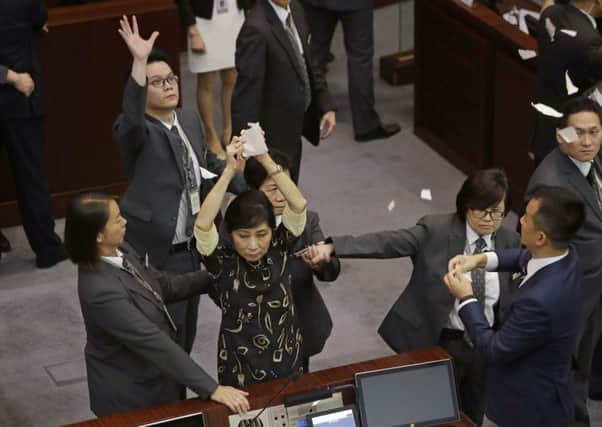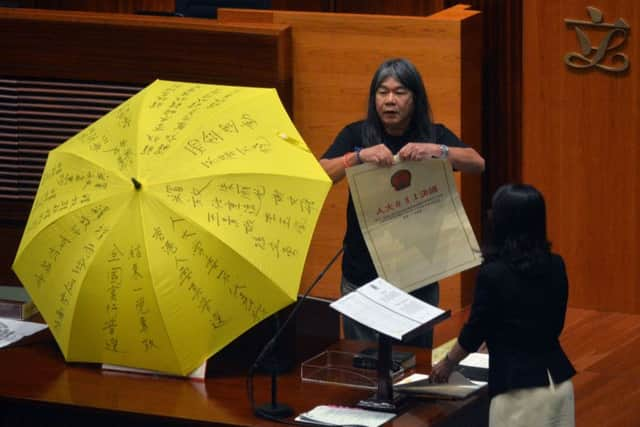Hong Kong's pro-democracy lawmakers in China oath protest


The new crop of lawmakers, elected last month amid swelling anti-China sentiment, object to the oath’s requirement to pledge allegiance to the “Hong Kong Special Administrative Region of the People’s Republic of China” and its Basic Law constitution.
The group came up with creative ways to protest against the oath.
Advertisement
Hide AdAdvertisement
Hide AdSixtus Leung, 30, of the radical Youngspiration party draped a blue flag with the words “Hong Kong is not China” over his shoulders.


His colleague Yau Wai-ching laid the same flag out in front of her.
They both vowed to defend the “Hong Kong nation” before reciting the oath in English but mispronouncing China as Shina, an old-fashioned derogatory Japanese term for the country.
Leung clutched a Bible in his right hand but also crossed his fingers. Wai-ching, 25, combined “republic” with a curse word. They were among three lawmakers whose oaths were not accepted by the legislative clerk.
The third protester, Mr Yiu, an independent, added lines to his oath, saying he would “fight for genuine universal suffrage”.


The provocative actions foreshadow what’s expected to be a chaotic term in the semi-democratic Legislative Council after September’s elections added to the opposition’s numbers in the semi-autonomous Chinese city.
The freshman lawmakers represent a new wave of grassroots groups that emerged from the wake of 2014 massive pro-democracy street protests, which failed to win concessions from Beijing but sparked a rising independence movement and a political awakening among the city’s young.
Lau Siu-lai, who founded her own party, Democracy Groundwork, took a slow-motion approach. She took about 10 minutes to repeat the declaration, which has less than 100 words, by pausing for several seconds after each one.
Advertisement
Hide AdAdvertisement
Hide AdNathan Law, who helped spearhead the 2014 protests and is Hong Kong’s youngest ever legislator at age 23, prefaced his oath by quoting Indian independence icon Mahatma Gandhi vowing never to bend to authorities.
“You can chain me. You can torture me. You can even destroy this body but you will never imprison my mind,” said Law, of the Demosisto party.
As he recited the oath, he raised his tone slightly when he mentioned the People’s Republic of China, in what some saw as a subtle way of turning the statement into a question about whether to bear allegiance.
The new lawmakers are required to recite a short oath before they can officially take their seats, which includes the words “Hong Kong is a special administrative region of China” multiple times.
Not everyone rebelled.
Ann Chiang, one of 40 pro-Beijing representatives in the 70-seat council, raised eyebrows by making her declaration in Mandarin, the language of mainland China, rather than the Cantonese spoken in Hong Kong.
Most of the other 70 new MPs were sworn in without incident, though some staged other protests. Scuffles later broke out after the three whose oaths were invalidated were locked out of a vote for the new LegCo president.
It is unclear whether the lawmakers whose oaths were invalidated will be allowed to take their seats.
Since pro-democracy demonstrations in 2014, a small number of people have been advocating for independence for Hong Kong. Referred to as localists they reject what they perceive to be Beijing’s growing influence on Hong Kong.